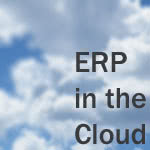ERP
Why More Companies Are Migrating from On-Premise to Cloud ERP Systems

As tech industry giants like Microsoft, Oracle and SAP are re-structuring their entire organization to accommodate their core business operations within the cloud, it has become crystal clear that the cloud is bound to live up to its hype. This drastic technological paradigm shift will inevitably impact all business using ERP installations. Companies that were previously adamant about sticking with their own on-premise ERP system are now beginning to see the tremendous potential that lies within making cloud computing synonymous with enterprise computing. Let us give you a brief rundown of the key business considerations that will determine the growth in migration of on-premise ERP systems to Cloud ERP systems.
Assessing Security Efficiency
As the threat of hacking and privacy concerns rapidly increase, businesses are significantly upgrading their security models to safeguard their data. Cloud-based applications are made up of composable services from numerous sources that can greatly increase the vulnerability of their system to attacks. As more cloud computing experts enter the field, these security and privacy concerns will be addressed with more clarity and efficiently dealt with. The increased availability of automated tools to systematically secure clouds will help ease the burden on organizations.
Accepting the Bring-Your-Own-Device Trend
With more and more organizations continuing to adopt more liberal policies towards employees using smartphones and tablets that aren’t company-issued, the onus of educating users about cloud computing security, introducing more products and formulating security protocols to deal with any potential data theft lies squarely on the shoulders of the company’s IT department. Acceptance and adaptation is the only realistic path forward to stay on track with the cloud revolution.
Going the Hybrid Way
One of the smarter alternatives for businesses hesitant about a full-fledged transition from an on-premise ERP system to cloud ERP is the option of developing hybrid cloud architecture. The idea is simple – provide the accessibility of company resources associated with a public cloud, while retaining a centralized policy managed by the company IT department. This dynamic computing architecture is more likely to gain acceptance in the future by business organizations.
The Power of Openness and Community-Driven Innovation
Easy accessibility and openness are one of the key reasons behind the success of a hybrid computing platform. It helps users evade lock-in to vendors and particular ecosystems. By upholding the principle of openness across various dimensions, such as copyrights, patents, APIs and standards, technology becomes much more accessible and user-friendly. This open source development keeps the user at the center of innovation and helps build a strong and vibrant community that drives technology forward more consistently.
Rise of the Private Platform-as-a-Service (PaaS) model
The private PaaS is one of the most efficient cloud computing models for companies that want to run applications without being forced to deal with the maintenance of hardware and software infrastructure. It is an ideal option for organizations that are too skeptical to shift all development to a public cloud. The simplicity and reliability of this model coupled with great features such as application multi-tenancy and auto-scaling makes it perfect for enterprise application development. Expect to see more widespread acceptance of the private and hybrid PaaS models in the upcoming years.
Want more information on ERP software? Discover and learn more about enterprise resource planning software by exploring blog posts, white papers and more at our ERP research center. For comparisons of the best ERP solutions on the market, download Business-Software.com’s Top 20 ERP Software reportResearch for this post was provided by Houston-based, ERP solution provider, Rand Group.]






